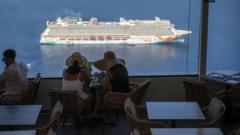With a series of earthquakes rocking Santorini since January, the island's crucial tourist industry faces potential challenges this summer, prompting concerns over reduced bookings and staff shortages. Experts and local business owners call for government support to navigate the crisis.
Santorini's Tourist Season in Jeopardy Amid Ongoing Earthquakes

Santorini's Tourist Season in Jeopardy Amid Ongoing Earthquakes
The famed Greek island faces uncertainty as tremors threaten both tourist arrivals and the local economy with summer approaching.
Santorini, the picturesque Greek island renowned for its stunning sunsets and vibrant tourism, is facing an uncertain summer tourist season as ongoing earthquakes continue to rattle the region. The tremors, which began in January, have already led to a noticeable decrease in bookings, with one cruise line canceling its scheduled visit, raising alarms among local business operators reliant on seasonal tourist influx.
As February marks the unofficial start of the tourist season, local stakeholders like Antonis Pagonis, president of Greece's Association of Hoteliers, express cautious optimism despite recent spikes in tremor activity. "In the past two days, we have seen a drop in bookings, but we hope this will be short-lived," says Pagonis. However, concerns extend beyond simple visitor numbers; many hotels may struggle to staff adequately as seasonal workers reconsider their options.
Santorini's temporary workforce, which typically swells alongside the tourist population, is crucial for managing the island's high summer demands. Many of these workers hail from other regions of Greece or neighboring countries. Manos, a bartender who has spent five consecutive summers working on the island, voiced his apprehension: "I'm worried there won't be enough tourists. If the season is weak, I might not make as much money.” Consequently, he has accepted a position in Corfu instead of returning to Santorini this year.
In addition to potential declines in tourist traffic, the ongoing seismic activity has hindered construction projects intended to prepare hotels for the busy season. Hotel owners are advocating for government assistance, including continued wage support for construction workers who cannot risk working in an unstable environment. Pagonis has indicated that while the government has shown receptivity to proposals, the execution of relief measures remains uncertain.
In light of recent destabilization, some sectors within the tourism industry assert that enhanced infrastructure investments should accompany emergency responses. Margarita Karamolegkou, owner of four local hotels, emphasized the need for improvements to support the larger workforce and tourist population. "While the state has acted quickly, we have long been asking for improvements such as a new port," she stated. Moreover, there are growing calls for greater regulations on private rental properties, which may not adhere to the same safety standards as established hotels.
Santorini contributes significantly to Greece's economy, with approximately 2.5% of the GDP linked to its tourism sector, generating an estimated €5.9 billion annually. Thus, any impact on the summer tourist season could lead to severe repercussions for local businesses. Although cancellations remain absent, the continuing decline in bookings provokes fear among hoteliers that if the situation remains unchanged for a month, it could result in catastrophic financial fallout.
Prime Minister Kyriakos Mitsotakis, during a recent visit to the island, recognized the urgency of preserving Santorini’s global reputation, stating, "It is our duty to protect it, preserve its reputation, and ensure that 2025 is another excellent year for tourism." While Karamolegkou acknowledges the risks posed by ongoing tremors, she maintains a hopeful outlook for the future of Santorini’s tourism, asserting, “I am confident that even with fewer staff, our services will remain exceptional.”



















